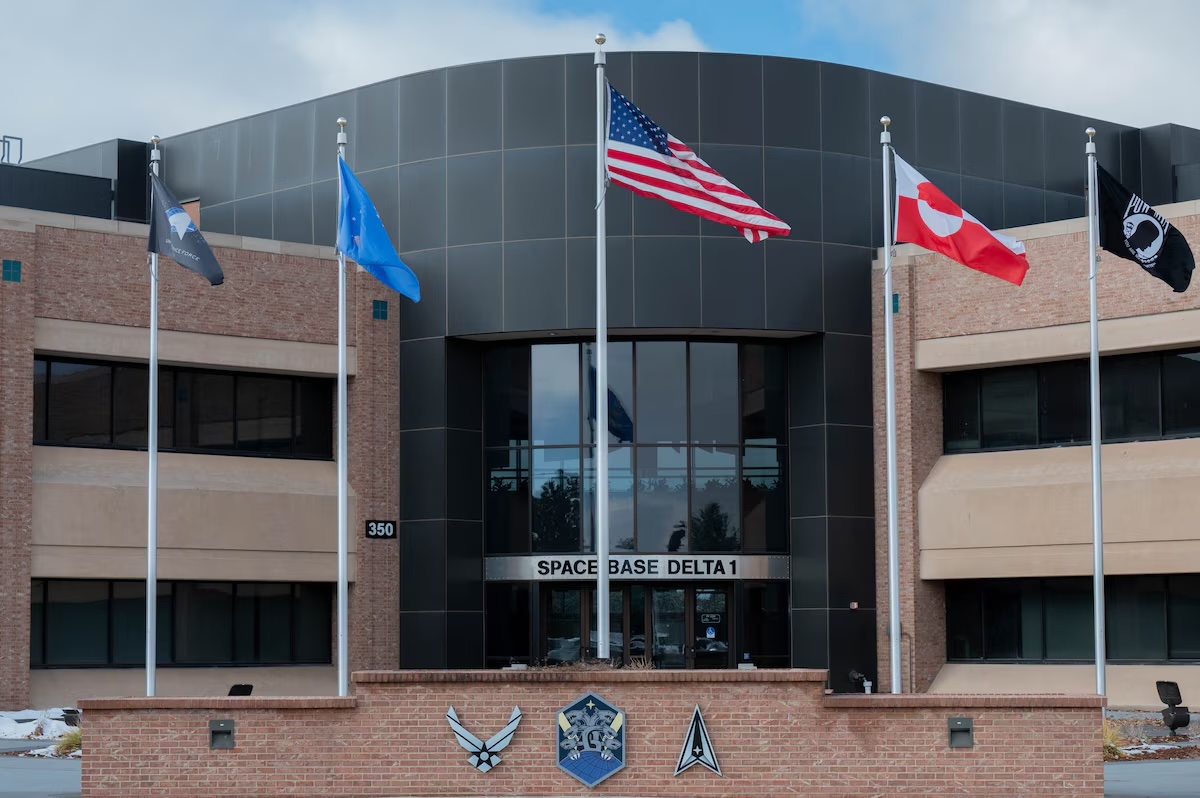The Pentagon says the move will save money, but acknowledges risk to military readiness.
President Donald Trump speaks to the media in the Oval Office at the White House on September 2, 2025 in Washington, DC. Credit: Alex Wong/Getty Images
President Donald Trump announced Tuesday that US Space Command will be relocated from Colorado to Alabama, returning to the Pentagon's plans for the command's headquarters from the final days of Trump's first term in the White House.
The headquarters will move to the Army's Redstone Arsenal in Huntsville, Alabama. Trump made the announcement in the Oval Office, flanked by Republican members of the Alabama congressional delegation.
The move will "help America defend and dominate the high frontier," Trump said. It also marks another twist on a contentious issue that has pitted Colorado and Alabama against one another in a fight for the right to be home to the permanent headquarters of Space Command (SPACECOM), a unified combatant command responsible for carrying out military operations in space.
Space Command is separate from the Space Force, and is made up of personnel from all branches of the armed services. The Space Force, on the other hand, is charged with supplying personnel and technology for use by multiple combatant commands. The newest armed service, established in 2019 during President Trump's first term, is part of the Department of the Air Force, which also had the authority for recommending where to base Space Command's permanent headquarters.
"US Space Command stands ready to carry out the direction of the president following today's announcement of Huntsville, Alabama, as the command's permanent headquarters location," SPACECOM wrote on its official X account.
Military officials in the first Trump administration considered potential sites in Colorado, Florida, Nebraska, New Mexico, and Texas before the Air Force recommended basing Space Command in Huntsville, Alabama, on January 13, 2021, a week before Trump left office.
Members of Colorado's congressional delegation protested the decision, suggesting the recommendation was political. Trump won a larger share of votes in Alabama in 2016, 2020, and 2024 than in any of the other states in contention. On average, a higher percentage of Colorado's citizens cast their votes against Trump than the other five states vying for Space Command's permanent headquarters.
Trump's reasons
Trump cited three reasons Tuesday for basing Space Command in Alabama. He noted Redstone Arsenal's proximity to other government and industrial space facilities, the persistence of Alabama officials in luring the headquarters away from Colorado, and Colorado's use of mail-in voting, a policy that has drawn Trump's ire but is wholly unrelated to military space matters.
"That played a big factor, also," Trump said of Colorado's mail-in voting law.
None of the reasons for the relocation that Trump mentioned in his remarks Tuesday explained why Alabama is a better place for Space Command's headquarters than Colorado, although the Air Force has pointed to cost savings as rationale for the move.
A Government Accountability Office (GAO) investigation concluded in 2022 that the Air Force did not follow "best practices" in formulating its recommendation to place Space Command in at Redstone Arsenal, leading to "significant shortfalls in its transparency and credibility."
A separate report in 2022 from the Pentagon's own inspector general concluded the Air Force's basing decision process was "reasonable" and complied with military policy and federal law, but criticized the decision-makers' record-keeping.
Former President Joe Biden's secretary of the Air Force, Frank Kendall, stood by the recommendation in 2023 to relocate Space Command to Alabama, citing an estimated $426 million in cost savings due to lower construction and personnel costs in Huntsville relative to Colorado Springs. However, since then, Space Command achieved full operational capability at Peterson Space Force Base, Colorado.

Now-retired Army Gen. James Dickinson raised concerns about moving Space Command from Colorado to Alabama. Credit: US Space Force/Tech. Sgt. Luke Kitterman
Army Gen. James Dickinson, head of Space Command from 2020 until 2023, favored keeping the headquarters in Colorado, according to a separate inspector general report released earlier this year.
"Mission success is highly dependent on human capital and infrastructure," Dickinson wrote in a 2023 memorandum to the secretary of the Air Force. "There is risk that most of the 1,000 civilians, contractors, and reservists will not relocate to another location."
One division chief within Space Command's plans and policy directorate told the Pentagon's inspector general in May 2024 that they feared losing 90 percent of their civilian workforce if the Air Force announced a relocation. A representative of another directorate told the inspector general's office that they could say "with certainty" only one of 25 civilian employees in their division would move to a new headquarters location.
Officials at Redstone Arsenal and information technology experts at Space Command concluded it would take three to four years to construct temporary facilities in Huntsville with the same capacity, connectivity, and security as those already in use in Colorado Springs, according to the DoD inspector general.
Tension under Biden
Essentially, the inspector general reported, officials at the Pentagon made cost savings their top consideration in where to garrison Space Command. Leaders at Space Command prioritized military readiness.
President Biden decided in July 2023 that Space Command's headquarters would remain in Colorado Springs. The decision, according to the Pentagon's press secretary at the time, would "ensure peak readiness in the space domain for our nation during a critical period." Alabama lawmakers decried Biden's decision in favor of Colorado, claiming it, too, was politically motivated.
Space Command reached full operational capability at its headquarters at Peterson Space Force Base, Colorado, two years ahead of schedule in December 2023. At the time, Space Command leaders said they could only declare Space Command fully operational upon the selection of a permanent headquarters.
Now, a year-and-a-half later, the Trump administration will uproot the headquarters and move it more than 1,000 miles to Alabama. But it hasn't been smooth sailing for Space Command in Colorado.
A new report by the GAO published in May said Space Command faced "ongoing personnel, facilities, and communications challenges" at Peterson, despite the command's declaration of full operational capability. Space Command officials told the GAO the command's posture at Peterson is "not sustainable long term and new military construction would be needed" in Colorado Springs.
Space Command was originally established in 1985, then the George W. Bush administration moved responsibility for military space activities under the auspices of US Strategic Command as part of a post-9/11 reorganization of the military's command structure. President Trump reestablished Space Command in 2019, months before Congress passed legislation to make the Space Force the nation's newest military branch.
Throughout its existence, Space Command has been headquartered at Peterson Space Force Base in Colorado Springs. But now, Pentagon officials say the growing importance of military space operations, and potentially space warfare, require Space Command to occupy a larger headquarters than the existing facility at Peterson.
Peterson Space Force Base is also the headquarters of North American Aerospace Defense Command, or NORAD, US Northern Command, and Space Operations Command, all of which work closely with Space Command. Space Command officials told the GAO there were benefits in being co-located with operational space missions and centers, where engineers and operators control some of the military's most important spacecraft in orbit.
Several large space companies also have significant operations or headquarters in the Denver metro area, including Lockheed Martin, United Launch Alliance, BAE Systems, and Sierra Space.
In Alabama, ULA and Blue Origin operate rocket and engine factories near Huntsville. NASA's Marshall Space Flight Center and the Army's Space and Missile Defense Command are located at Redstone Arsenal itself.

The headquarters building at Peterson Space Force Base, Colorado. Credit: US Space Force/Keefer Patterson
Colorado's congressional delegation—six Democrats and four Republicans—issued a joint statement Tuesday expressing their disappointment in Trump's decision.
"Today's decision to move US Space Command’s headquarters out of Colorado and to Alabama will directly harm our state and the nation," the delegation said in a statement. "We are united in fighting to reverse this decision. Bottom line—moving Space Command headquarters weakens our national security at the worst possible time."
The relocation of Space Command headquarters is estimated to bring about 1,600 direct jobs to Huntsville, Alabama. The area surrounding the headquarters will also derive indirect economic benefits, something Colorado lawmakers said they fear will come at the expense of businesses and workers in Colorado Springs.
"Being prepared for any threats should be the nation’s top priority; a crucial part of that is keeping in place what is already fully operational," the Colorado lawmakers wrote. "Moving Space Command would not result in any additional operational capabilities than what we have up and running in Colorado Springs now. Colorado Springs is the appropriate home for US Space Command, and we will take the necessary action to keep it there."
Alabama's senators and representatives celebrated Trump's announcement Tuesday.
"The Air Force originally selected Huntsville in 2021 based 100 percent on merit as the best choice," said Rep. Robert Aderholt (R-Alabama). "President Biden reversed that decision based on politics. This wrong has been righted and Space Command will take its place among Huntsville’s world-renowned space, aeronautics, and defense leaders."
Democratic Colorado Gov. Jared Polis said in a statement that the Trump administration should provide "full transparency" and the "full details of this poor decision."
"We hope other vital military units and missions are retained and expanded in Colorado Springs. Colorado remains an ideal location for future missions, including Golden Dome," Polis said, referring to the Pentagon's proposed homeland missile defense system.










 English (US) ·
English (US) ·